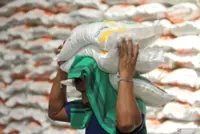
JAKARTA: President Prabowo Subianto’s flagship free nutritious meal programme cannot shield the Indonesian economy from the impact of United States tariffs on imports from the archipelago, former vice president Jusuf Kalla (pic0 has said.
He argued that the free meals programme was purely a domestic policy in nature and has no connection to international trade dynamics.
“This [tariff issue] concerns industry; hot sectors like palm oil, rubber, shrimp. It has nothing to do with the nutritious meal programme,” he told reporters on Saturday, as quoted by Kumparan.
Kalla also suggested that the government evaluate the implementation of the programme, citing the potential administrative burden on the National Nutrition Agency if it was expected to manage the programme on its own.
Kalla’s comments came after presidential spokesman Hasan Nasbi previously said on Thursday that President Prabowo’s administration had prepared three main strategies to maintain the stability of the domestic economy amid global pressures, including impacts from US President Donald Trump's tariffs.
The free meals programme is one of the three strategies, Hasan said, adding that the remaining two were increasing food and energy production and ensuring fiscal stability.
The administration has on several occasions suggested that the free meals programme is both a social policy and a tool to boost the local economy.
The centerpiece of an election campaign that catapulted Prabowo to power last year, the initiative aims to feed nearly 83 million people, including students, teachers, pregnant women and toddlers by the end of the year.
Banking on the programme, President Prabowo and his administration have aimed for the country’s economy to grow by 8 per cent annually.
The US last week included Indonesia in a second round of “reciprocal tariffs”, raising import duties by 32 per cent, effective April 9.
The measure goes beyond a general 10 per cent baseline tariff that Washington plans to apply to all imports from multiple countries starting April 5.
Washington argued that Jakarta’s policies amount to a 64 per cent tariff-equivalent on US products, blaming non trade barriers, such as currency practices and market restrictions.
Indonesia’s main export products to the US include electronics, textile and textile products, footwear, palm oil, rubber, furniture and shrimp, according to the Foreign Ministry’s statement.
While Trump’s order exempted 1,000 product categories like pharmaceuticals and semiconductors, new tariffs on some were still under review.
Twenty-five countries find themselves on a list for reciprocal tariffs ranging from 10 per cent to 49 per cent.
Seven of the 10 Asean countries are on the list, and with the exception of Singapore, all of them are subject to a levy higher than the baseline 10 per cent tariff.
Meanwhile, experts have warned that Trump’s tariffs could dampen Indonesian exports and lead to layoffs among local industries, especially those relying on foreign markets to sell their products. - The Jakarta Post/ANN











































